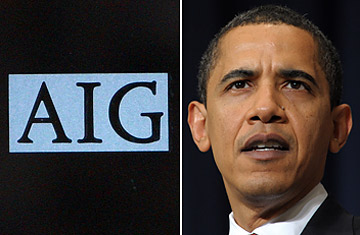
President Barack Obama
The White House scrambled on Monday to get ahead of the latest outrage stemming from the bailout of failed corporate behemoth American International Group (AIG): $165 million in bonus pay for executives in one part of the firm, which is now 80% controlled by American taxpayers.
President Barack Obama took to the podium in the East Room to tag AIG by name, calling its financial predicament a product of "recklessness and greed." The President said he has asked Treasury Secretary Timothy Geithner to "block these bonuses and make the American taxpayers whole," adding, "This isn't just a matter of dollars and cents. It's about our fundamental values."
The move came after Obama officials spent part of the weekend playing defense on AIG, as more details of the bailout became public. But the harsh criticism of the company is unlikely to stem rising public outrage with the multibillion-dollar cleanup operation. That anger came after federal officials named dozens of U.S. and European financial institutions that, together with municipalities in Virginia, California and elsewhere, have shared in more than $170 billion in AIG bailout money. (See 25 people to blame for the financial collapse.)
Before Obama spoke, House Speaker Nancy Pelosi joined a bipartisan gaggle of congressional leaders to denounce the bonuses, which she called "outrageous." Pelosi demanded that "executives at AIG right the wrong they have done to American taxpayers, who are footing the bill for the most expensive government rescue in history. They should renounce the bonuses and refuse the excessive retention pay they previously agreed to."
For its part, AIG claims the company is contractually required to pay its employees — including $9.5 million to top executives — and that the money is necessary to retain "the best and the brightest" to keep the insurance giant afloat.
Obama's focus at the White House was on bonuses for AIG's 370-person financial products division, the London-based unit largely responsible for the company's debacle involving bad bets insuring mortgage-backed securities. Overall, however, three separate, AIG-wide retention and bonus payments due to start later in March will spread some $1.2 billion among roughly 6,400 of the firm's 116,00 staff. Seven people at the financial products unit are in line for more than $3 million in extra 2008 compensation.
Equally upsetting to critics is the list of dozens of companies already benefiting from the AIG bailout. These firms, which insured their purchases of mortgage-backed and other securities with AIG, include investment giant Goldman Sachs ($12.9 billion), Merrill Lynch ($6.8 billion), Bank of America ($5.2 billion) and Citigroup ($2.3 billion). The same firms, directly or indirectly, also received earlier bailout cash under the Troubled Asset Relief Program (TARP). The group includes some of the most sophisticated investors in the world, prompting critics to question why the companies should not take responsibility for their own financial decisions, rather than accept a U.S. taxpayer handout.
Big foreign companies also figured prominently on the list. In fact, they got nearly $60 billion at a time when U.S. firms, notably General Motors, are having to beg for federal dollars just to stay solvent. The biggest winners were French banks, including Société Général, which together scored $19 billion, and German banks, including Deutsche Bank, which got a combined $17 billion.
Several big beneficiaries are also engaged in controversial activities at odds with U.S. policy. One example is UBS, the Union Bank of Switzerland, which got $5 billion. It recently reached a $780 million deferred-prosecution agreement with the Department of Justice to settle charges that it had deployed undisclosed offshore bank accounts to assist rich Americans in evading U.S. taxes. DoJ is still seeking to force UBS to disclose the names of 52,000 Americans suspected as part of the alleged scheme.
AIG can expect no respite from controversy. On Wednesday, for example, Paul E. Kanjorski, chairman of the House Financial Services Subcommittee on Capital Markets, Insurance and Government-Sponsored Enterprises, will hold a hearing likely to raise even more questions about the company. In a statement, Kanjorski said, "Unfortunately, taxpayers do not understand how AIG ended up in such a terrible situation, nor do they understand why the Federal Government continues to give it money." It was not clear whether AIG executives would attend the hearing.
Read "AIG's Distress: Are There Enough Fingers for This Dike?"
